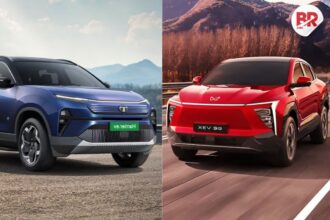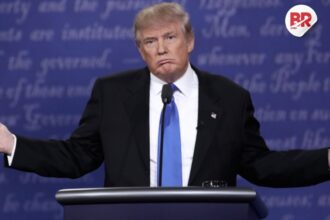
The Indian automobile industry, which plays a key role in the country’s economy, is facing tough times due to global challenges. Major companies like Tata Motors and Ashok Leyland are rethinking their international business plans, while auto parts manufacturers are dealing with uncertainty.
Two major factors are creating problems for the industry:

-
Tariffs (extra taxes on exports) imposed by countries like the United States.
-
A slowdown in the electric vehicle (EV) market, affecting future growth.
Read More: Trump’s 25% Car Tariff Shocks India: Can Tata & Eicher Survive?
How U.S. Tariffs Are Hurting Indian Automakers
The United States has introduced new tariffs, making it more expensive for Indian companies to sell their vehicles and auto parts there. Many Indian automakers were planning to expand in the U.S. market, but these extra costs have forced them to change their plans.
Here’s how tariffs are affecting the industry:
-
Higher Costs: The extra taxes have made Indian cars and auto parts more expensive, reducing their competitiveness.
-
Supply Chain Issues: Already struggling with delays due to global tensions and COVID-19, the auto industry now faces further disruptions.
-
Price Increases: Companies may pass on these higher costs to customers, making vehicles more expensive and reducing demand.
The Slowdown in Electric Vehicles (EVs)
While EVs were growing in popularity, the market has now slowed down. Several reasons are behind this:
-
Shortage of Key Parts: Critical components like semiconductors and battery materials are in short supply, delaying EV production.
-
Higher Material Costs: The prices of essential battery materials like lithium and cobalt have increased, making EVs more expensive.
-
Changing Government Policies: Shifts in EV policies and incentives in Europe and North America have created uncertainty for automakers.
Also See: US President Donald Trump says he may cut China tariffs to finalise TikTok deal
How the Industry is Adapting
To deal with these challenges, Indian automakers are taking new steps:
-
Exploring New Markets: Companies are looking for alternative countries to expand their business.
-
Investing in Technology: Automakers are focusing on innovation to stay competitive.
-
Diversifying Products: Businesses are expanding their product range to reduce reliance on any one market.
This is a critical time for the Indian auto industry. In Part 2 of this article, we will explore solutions and strategies that can help Indian automakers overcome these challenges and succeed in the global market.












